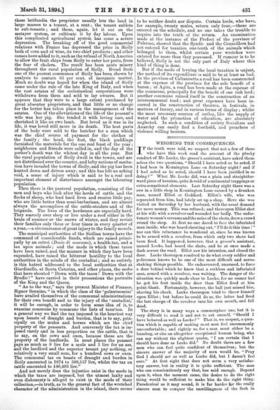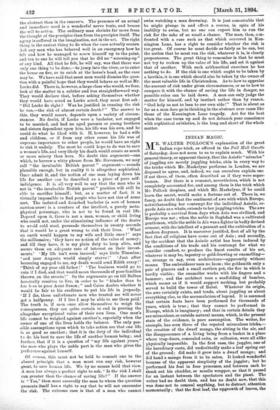WEIGHING THE CONSEQUENCES.
IF the truth were told, we suspect that not a few of those who have this week read the account of the plucky conduct of Mr. Locke, the grocer's assistant, have asked them- selves the two questions, " Should I have acted as he acted, if I had been in Kennington Lane on Saturday night P and if I had acted as he acted, should I have been justified in so doing ? " What Mr. Locke did, was a plain and straightfor- ward piece of heroism, quite devoid of sentimental trappings or extraeenlational elements. Last Saturday night there was a row in a little shop in Kennington Lane caused by a drunken man, named Elliot or Goddard. Elliot's wife, who was separated from him, had lately set up a shop. Here she was visited on Saturday by her husband, with the usual demand for more money. This was refused; and thereupon Elliot shot at his wife with a revolver and wounded her badly. The unfor- tunate woman's screams andthe noise of the shots, drew a crowd round the shop. At first no one dared to face the infuriated man inside, who was heard shouting out, " I'll do it this time ! " nor can this reluctance be wondered at, since he was known to be armed with a revolver, from which only two shots had been fired. It happened, however, that a grocer's assistant, named Locke, had heard the shots, and he at once made a dash across the road. Elliot saw his intention, and closed the door. Locke thereupon resolved to do what every soldier and policeman knows to be one of the most difficult and nerve- shaking things possible. He endeavoured, unarmed, to force a door behind which he knew that a reckless and infuriated man, armed with a revolver, was waiting. The danger of the situation was quickly made clear to Locke, for no sooner had he got his foot inside the door than Elliot fired at him pointblank. Fortunately, however, the ball just missed him, shaving his cheek. Locke thereupon tried to throw himself upon Elliot ; but before he could do so, the latter had fired the last charge of the revolver into his own mouth, and fell dead.
The story is in many ways a commonplace one, but it is very difficult to read it and not to ask oneself, "Should I have behaved as well as Locke P" That is, we suspect, a ques- tion which is capable of making most men feel uncommonly uncomfortable ; and rightly so, for a man must either be a humbug, or else an altogether exceptional human being, who can say without the slightest qualm, " I am certain that I should have done as Locke did." No doubt there are a few men who can feel quite confident of themselves ; but the sincere answer of the majority of men would be, " Pray God I should act as well as Locke did, but I daren't feel sure." At first sight that does not seem a very satisfac- tory answer, but in reality it is quite sufficient. The man who can conscientiously say that, has said enough. Depend upon it, when the moment came, the desire to do the right thing would be sufficient to make him do the right thing. Paradoxical as it may sound, it is far harder for the really sincere man to conquer the unwillingness of the flesh in
the abstract than in the concrete. The presence of an actual and immediate need is a wonderful nerve tonic, and braces the will to action. The ordinary man shrinks far more from the thought of the precipice than from the precipice itself. The agony is suffered in the imagination, not in the act.. The right thing is the easiest thing to do when the case actually occurs.
Ask any man who has behaved well in an emergency how he felt and how he managed to screw himself up to the point, and ten to one he will tell you that he did no " screwing-up " of any kind. All that he felt, he will say, was that there was only one thing to be done,—to jump into the river, or to enter the house on lire, or to catch at the horse's head, as the case may be. We have said that most men would dismiss the ques- tion with a painful hope that they would behave as well as Mr.
Locke did. There is, however, a large class who would, we fear, look at the matter in a subtler and less straightforward way. They would declare that, before asking themselves whether they would have acted as Locke acted, they must first ask : "Did Locke do right? Was he justified in running the risk he ran,—the risk of almost certain death ? " The answer to this, they would assert, depends upon a variety of circum- stances. No doubt, if Locke were a bachelor, not engaged to be married, and had no aged parents or young brothers and sisters dependent upon him, his life was his own, and he could do what he liked with it. If, however, he bad a wife and children, or if from any other cause his life was of supreme importance to other people, he would have no right to risk it unduly. The most he could hope to do was to save a woman's life, and very likely his death would create as much or more misery than hers. No doubt this argument—one which, to borrow a witty phrase from Mr. Stevenson, we may call "the invaluable British parent" argument — sounds plausible enough, but in reality it is altogether sophistical. Once admit it, and the notion of one man laying down his life for another can be described as a piece of pure self- indulgence. It is all very well to say that the man who is not in "the invaluable British parent" position will still be able to sacrifice himself ; but, as a matter of fact, it is virtually impossible to find people who have not ties of some sort. The isolated and detached bachelor (a sort of human carrion-crow) is a creature of the intellect, a purely meta- physical personage, who is not to be found in real life. Depend upon it, there is not a man, woman, or child living who could not, under the stimulating influence of the desire to avoid cold steel, persuade themselves in twenty seconds that it would be a great wrong to risk their lives. What on earth would happen to my wife and little ones ? ' says the millionaire; 'they have no notion of the value of money; and till they have, it is my plain duty to keep alive, and secure them an adequate rate of interest on their invest- ments.' life isn't even insured,' says little Timmins; `and poor Augusta would simply starve!' ` Just after becoming engaged to me, my death would send Edith crazy!.' ' Think of my poor old father ! " The business would go to ruin if I died, and that would mean thousands of poor families thrown on the streets ! ' So the arguments go on till Balbus heroically resolves to live, in order to be "kinder than he has been to poor Aunt Susan ; " and Caine doubts whether it would be fair to his creditors to put his life in jeopardy. If I die, these unfortunate men who trusted me will never get a halfpenny. If I live I may be able to see them paid.' The truth is, if men once allow themselves to weigh the consequences, they are quite certain to end in proving the altogether exceptional value of their own lives. One man's life cannot be weighed against another's, especially when the owner of one of the lives holds the balance. The only pos- sible assumptions upon which to take action are that one life is as good as another; that it is the duty of the individual to do his beat to save the life of another human being ; and farther, that if it is a question of "my life against yours," the man who plays the noble part is the man who gives the preference against himself.
Of course, this mast not be held to commit one to the absurd principle that a man must run any risk, however great, to save human life. We by no means hold that view. A man has always a perfect right to ask, "Is the risk I shall run greater than the chance of saving life?" If the answer is " Yes," then most assuredly the man to whom the question presents itself has a right to say that he will not encounter the risk. The extreme case is that of a man who cannot
swim watching a -man drowning. It is just conceivable that he might plunge in and effect a rescue, in spite of his inability to swim, but no one can expect him to run the risk for the sake of so small a chance. The man, then, con- fronted with a case such as that which occurred in Ken- nington Lane, has a right to consider whether the risk is too great. Of course he must decide as fairly as he can, but the notion that he must run the risk, whatever it is, is clearly preposterous. The great thing to remember is that he must not try to reckon up the value of his life, and set it against that of another. With such arithmetical exercises he has nothing to do. If the risk is one which ought to be taken by a larrikin, it is one which should also be taken by the owner of the most valuable life in Christendom. As to how to appraise the amount of risk under given circumstances, or as to how to compare it with the chance of saving the life in danger, no possible rules can be laid down. A man can only judge the matter for himself, and by instinct rather than by reason. " God help us not to lean to our own side !" That is about as far as a man dare go in thinking in the abstract over cases like those of the Kennington Lane tragedy. Act for the best when the case turns up and do not debauch your conscience with sophistical subtleties, is the long and short of the whole matter.



































 Previous page
Previous page